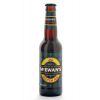McEwan’s Brewery - McEwan’s Scotch Ale
-
ABV:
8% -
Bottle Size:
330-ml -
Serving Temperature:
40-55° F -
Suggested Glassware:
Thistle, Snifter, Tulip
This classic Scotch Ale presents a gorgeous brownish-garnet-red hue topped with fluffy khaki foam. British beer styles often provide deceptive complexity in a remarkably balanced overall character, and McEwan’s Scotch Ale is no exception. Look for aromas of red fruits and figs, along with malty caramel and light toffee notes. These aromas carry over to the flavor where they blossom across the palate. Rich caramel and toffee character forms a prominent core, punctuated by bold notes of raisins, dried figs, and various candied fruits. There are some noticeable toasty bread undertones here too, along with a wisp of molasses. Per the style, hops are not super bold, but there is a pleasant, lightly floral and woodsy hop bitterness providing balance to the beer’s moderate residual malt sweetness. The result is a smoothly balanced brew with lots of subtle complexities, and a very well-hidden (but warming) 8% ABV. We love Scotch Ales a la carte as a nightcap, but they make good pairings for caramel-centric desserts (especially those with fruit, too), as well as a snack of well-aged cheeses. Cheers!
Though the McEwan’s brand is now under the umbrella of the even older Marston’s Brewery, the history of McEwan’s is separate and deserving of its own telling. William McEwan founded his brewery in Edinburgh, Scotland in 1856. The site he selected for his brewery was Edinburgh’s Fountainbridge neighborhood, known for its excellent spring water. Not surprisingly, he named the facility the “Fountain Brewery.” By the mid-1860s he had forged not only local demand for his beer, he had also grown a robust export business throughout the Crown’s territories via his father’s shipping company.
The late 19th century was a golden age for Edinburgh’s brewing industry, as approximately 40 breweries were in operation around the city, each located near wells which allowed them to harness the city’s excellent water. Edinburgh was known as one of the most important and productive brewing cities on the planet. By 1889, McEwan’s was considered the largest single-owner brewery in the UK, producing 2 million barrels annually, much of which was exported around the world.
McEwan’s fortunes, along with those of Edinburgh’s brewing industry as a whole, would sadly change in the first half of the 20th century with WWI, the Great Depression, and WWII providing a series of very hard times. In 1930, McEwan’s merged with their competitor, William Younger’s, in order to help both Edinburgh brewers weather the Depression. Over the decades, the export business shrank and Younger’s Abbey Brewery closed. But, in 1973, an influx of investment helped McEwan’s move their Fountain Brewery to a new nearby location sporting new equipment and modern brewing technology, helping the company establish the footing needed to flourish in the modern brewing environment. In 2004, production of McEwan’s ales were moved to Edinburgh’s nearby Caledonian Brewery. In 2011, McEwan’s came into the fold of Charles Wells, an independent, family-owned company which then, in turn, was acquired in 2017 by Marston's Brewery, which dates back to 1834. For more info, visit them at www.mcewans.co.uk.

Unmatched Variety by style, brewery & country
Choose from Five different Beer Clubs offering unmatched variety by brewery,
country of origin, and beer style to suit your specific tastes.


